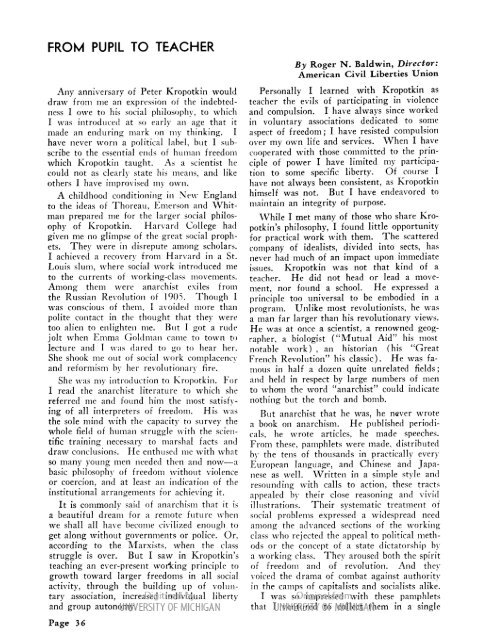Centennial Expressions on Peter Kropotkin 1842-1942.
Centennial Expressions on Peter Kropotkin 1842-1942.
Centennial Expressions on Peter Kropotkin 1842-1942.
You also want an ePaper? Increase the reach of your titles
YUMPU automatically turns print PDFs into web optimized ePapers that Google loves.
FROM PUPIL TO TEACHER<br />
Any anniversary of <strong>Peter</strong> <strong>Kropotkin</strong> would<br />
draw from me an expressi<strong>on</strong> of the indebtedness I owe to his social philosophy, to which<br />
I was introduced at so early an age that it<br />
made an enduring mark <strong>on</strong> my thinking. I<br />
have never worn a political label, but I subscribe to the essential ends of human freedom<br />
which <strong>Kropotkin</strong> taught. As a scientist he<br />
could not as clearly state his means, and like<br />
others I have improvised my own.<br />
A childhood c<strong>on</strong>diti<strong>on</strong>ing in New England<br />
to the ideas of Thoreau, Emers<strong>on</strong> and Whitman prepared me for the larger social philosophy of <strong>Kropotkin</strong>. Harvard College had<br />
given me no glimpse of the great social prophets. They were in disrepute am<strong>on</strong>g scholars.<br />
I achieved a recovery from Harvard in a St.<br />
Louis slum, where social work introduced me<br />
to the currents of working-class movements.<br />
Am<strong>on</strong>g them<br />
were anarchist exiles from<br />
the Russian Revoluti<strong>on</strong> of 1905. Though I<br />
was c<strong>on</strong>scious of them, I avoided more than<br />
polite c<strong>on</strong>tact in the thought that they were<br />
too alien to enlighten me. But I got a rude<br />
jolt when Emma Goldman came to town to<br />
lecture and I was dared to go to hear her.<br />
She shook me out of social work complacency<br />
and reformism by her revoluti<strong>on</strong>ary fire.<br />
She was my introducti<strong>on</strong> to <strong>Kropotkin</strong>. For<br />
I read the anarchist literature to which she<br />
referred me and found him the most satisfying of all interpreters of freedom. His was<br />
the sole mind with the capacity to survey the<br />
whole field of human struggle with the scientific training necessary to marshal facts and<br />
draw c<strong>on</strong>clusi<strong>on</strong>s. He enthused me with what<br />
so many young men needed then and now-a<br />
basic philosophy of freedom without violence<br />
or coerci<strong>on</strong>, and at least an indicati<strong>on</strong> of the<br />
instituti<strong>on</strong>al arrangements for achieving it.<br />
It is comm<strong>on</strong>ly said of anarchism that it is<br />
a beautiful dream for a remote future when<br />
we shall all have become civilized enough to<br />
get al<strong>on</strong>g without governments or police. Or,<br />
according to the Marxists, when the class<br />
struggle is over. But I saw in <strong>Kropotkin</strong>'s<br />
teaching an ever-present working principle to<br />
growth toward larger freedoms in all social<br />
activity, through the building up of voluntary associati<strong>on</strong>, increased individual liberty<br />
and group aut<strong>on</strong>omy.<br />
Page 36<br />
By Roger N. Baldwin, Director:<br />
American Civil Liberties Uni<strong>on</strong><br />
Pers<strong>on</strong>ally I learned with <strong>Kropotkin</strong> as<br />
teacher the evils of participating in violence<br />
and compulsi<strong>on</strong>. I have always since worked<br />
in voluntary associati<strong>on</strong>s dedicated to some<br />
aspect of freedom; I have resisted compulsi<strong>on</strong><br />
over my own life and services. When I have<br />
cooperated with those committed to the principle of power I have limited my participati<strong>on</strong> to some specific liberty. Of course I<br />
have not always been c<strong>on</strong>sistent, as <strong>Kropotkin</strong><br />
himself was not. But I have endeavored to<br />
maintain an integrity of purpose.<br />
While I met many of those who share <strong>Kropotkin</strong>'s philosophy, I found little opportunity<br />
for practical work with them. The scattered<br />
company of idealists, divided into sects, has<br />
never had much of an impact up<strong>on</strong> immediate<br />
issues. <strong>Kropotkin</strong> was not that kind of a<br />
teacher. He did not head or lead a movement, nor found a school. He expressed a<br />
principle too universal to be embodied in a<br />
program. Unlike most revoluti<strong>on</strong>ists, he was<br />
a man far larger than his revoluti<strong>on</strong>ary views.<br />
He was at <strong>on</strong>ce a scientist, a renowned geographer, a biologist ("Mutual Aid" his most<br />
notable work), an historian (his "Great<br />
French Revoluti<strong>on</strong>" his classic). He was famous in half a dozen quite unrelated fields;<br />
and held in respect by large numbers of men














![The Philosophy of Progress [pdf]](https://img.yumpu.com/14077359/1/190x245/the-philosophy-of-progress-pdf.jpg?quality=85)

